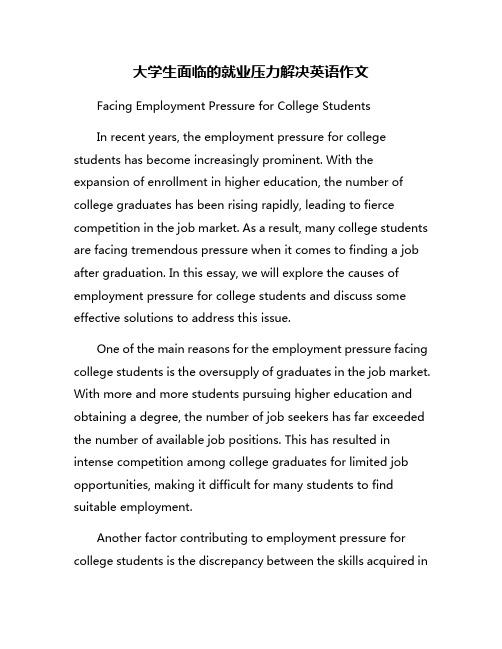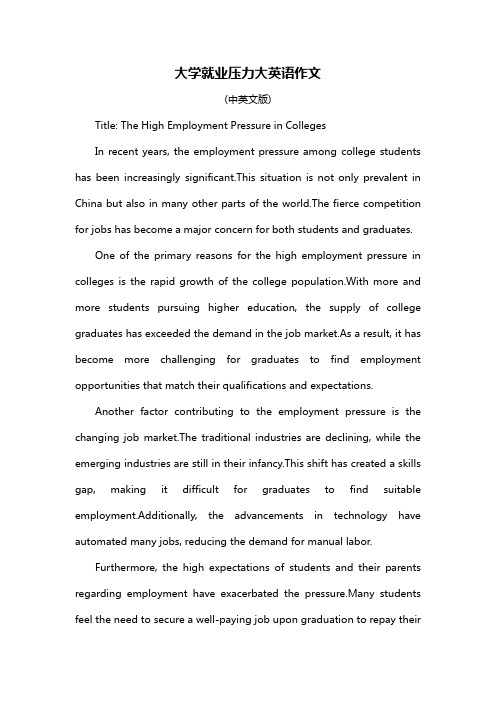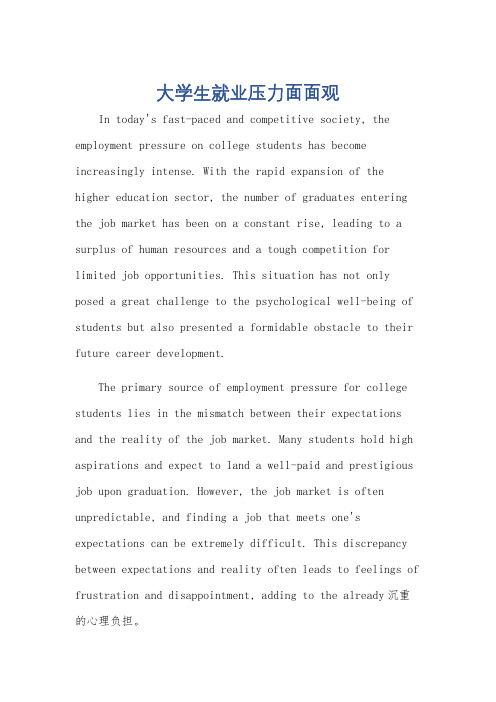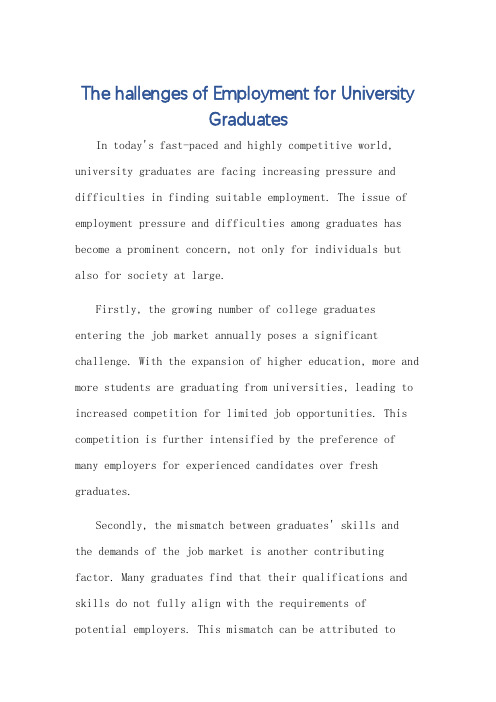大学生就业压力的研究外文翻译
就业问题的压力英文作文

就业问题的压力英文作文1. The pressure of job hunting can be overwhelming. The constant need to prove oneself and compete with others for limited opportunities can create a sense of anxiety and stress. It's like being in a never-ending race, where every step counts and every mistake can cost you dearly.2. The fear of unemployment is another source of pressure. The idea of not having a stable income and being dependent on others can be terrifying. It's like standing on the edge of a cliff, unsure of what lies ahead and fearing the worst.3. Society's expectations add to the pressure. There isa certain societal norm that suggests success is defined by a high-paying job and a prestigious career. Straying from this path can make one feel like a failure, as if they are not living up to the expectations of others.4. The pressure is further intensified by the constantcomparison to others. Seeing friends and peers succeed in their careers can make one feel inadequate and left behind. It's like being on a treadmill, running as fast as you can but never getting any closer to your goal.5. Financial concerns also contribute to the pressure. The need to support oneself and potentially a family can create a sense of urgency to find a job quickly. It's like juggling multiple balls in the air, trying to keep everything in balance and not letting anything drop.6. The fear of making the wrong career choice adds to the pressure. The thought of investing time and effort into a job only to realize it's not the right fit can be daunting. It's like walking on a tightrope, trying to find the perfect balance between passion and practicality.7. The pressure to conform to societal standards of success can also lead to a lack of fulfillment. Many people find themselves in jobs that they are not passionate about, simply because it is what is expected of them. It's like wearing a mask, pretending to be someone you're not, justto fit in.8. The pressure to constantly improve and stay competitive in the job market can be exhausting. The needto constantly upgrade skills and adapt to new technologies can create a sense of never-ending learning. It's like running on a hamster wheel, always striving to stay aheadbut never truly reaching the finish line.9. The pressure of job security is a constant worry. With the rise of automation and artificial intelligence,the fear of being replaced by machines looms large. It'slike being on thin ice, never knowing when it might crack beneath your feet.10. Overall, the pressure of the job market can have a significant impact on one's mental and emotional well-being. It's important to recognize and address these pressures, seeking support and finding ways to cope with the stress. Remember, you are not alone in this journey, and there is always hope for a brighter future.。
大学生面临的就业压力解决英语作文

大学生面临的就业压力解决英语作文Facing Employment Pressure for College StudentsIn recent years, the employment pressure for college students has become increasingly prominent. With the expansion of enrollment in higher education, the number of college graduates has been rising rapidly, leading to fierce competition in the job market. As a result, many college students are facing tremendous pressure when it comes to finding a job after graduation. In this essay, we will explore the causes of employment pressure for college students and discuss some effective solutions to address this issue.One of the main reasons for the employment pressure facing college students is the oversupply of graduates in the job market. With more and more students pursuing higher education and obtaining a degree, the number of job seekers has far exceeded the number of available job positions. This has resulted in intense competition among college graduates for limited job opportunities, making it difficult for many students to find suitable employment.Another factor contributing to employment pressure for college students is the discrepancy between the skills acquired inschool and the demands of the job market. Many graduates lack practical skills and work experience, which are essential for success in the workplace. Employers are increasingly looking for candidates who possess not only academic knowledge but also relevant skills and experience. This mismatch between the skills of college graduates and the requirements of employers exacerbates the job search process for many students.To address the issue of employment pressure for college students, it is important for both students and educational institutions to take proactive measures. Firstly, students should start preparing for their career early on during their college years. They should actively participate in internships, extracurricular activities, and part-time jobs to gain practical experience and develop relevant skills. By doing so, students can enhance their competitiveness in the job market and increase their chances of finding employment after graduation.Educational institutions also play a crucial role in helping students navigate the job market effectively. Universities should focus on improving the quality of education and providing students with opportunities for hands-on learning and skill development. Career counseling services, job fairs, and networking events should be organized regularly to connectstudents with potential employers and help them explore different career options. By equipping students with the necessary skills and knowledge, educational institutions can better prepare them for the challenges of the job market.In addition, the government and society as a whole need to support initiatives that promote employment for college students. Policies should be implemented to create more job opportunities for graduates, especially in emerging industries with high demand for skilled workers. Financial incentives and subsidies could be offered to companies that hire college graduates, encouraging them to invest in young talent and provide training and career development opportunities.Overall, the issue of employment pressure for college students is a complex and multifaceted problem that requires collective effort to address. By taking proactive measures at the individual, institutional, and societal levels, we can help alleviate the challenges facing college graduates in the job market and create a more favorable environment for their career development. With the right support and preparation, college students can overcome employment pressure and embark on a successful and fulfilling career path.。
大学生就业压力大就业难英语作文

大学生就业压力大就业难英语作文(中英文实用版)**English Essay: The Stress and Challenges of Employment for College Graduates**The transition from college to the workforce has become an increasingly arduous journey for many graduates.The stress and difficulty of securing employment have become significant issues that college students have to grapple with.Several factors contribute to this daunting scenario, and it"s crucial to understand them to navigate the job market effectively.Firstly, the expansion of higher education has led to a surge in the number of graduates.With more people holding degrees, the competition in the job market has intensified.Employers now have a larger pool of candidates to choose from, and as a result, they can be more selective.This increased selectivity adds pressure on graduates to stand out, often requiring them to possess not only academic qualifications but also practical experience and skills.Secondly, the rapidly changing economy and technological advancements have transformed the job landscape.Many traditional roles are disappearing, while new ones are emerging.This shift requires students to keep up with the latest industry trends and acquire new skills that are in demand.The pressure to constantly adapt and upskill can beoverwhelming.Moreover, the disparity between educational majors and job market demands adds to the difficulty of employment.Some graduates find that their chosen fields of study do not align with the needs of the job market, making it challenging to secure employment in their areas of expertise.Lastly, the psychological impact of these challenges cannot be overlooked.The stress of finding a job can lead to anxiety and depression among graduates.The fear of not living up to societal expectations or personal goals can be disheartening and affect their overall well-being.In conclusion, the stress and challenges of employment for college graduates are multifaceted.Addressing these issues requires a combination of personal resilience, educational institutions" adaptability, and societal support.Preparing students for the job market through internships, vocational training, and lifelong learning opportunities is essential.Equally important is fostering a supportive environment that acknowledges the efforts and contributions of all graduates, regardless of their employment status.**中文作文:大学生就业压力大就业难**大学生步入职场的道路变得越来越艰难,就业的压力和难度成为了他们必须面对的重要问题。
大学就业压力大英语作文

大学就业压力大英语作文(中英文版)Title: The High Employment Pressure in CollegesIn recent years, the employment pressure among college students has been increasingly significant.This situation is not only prevalent in China but also in many other parts of the world.The fierce competition for jobs has become a major concern for both students and graduates.One of the primary reasons for the high employment pressure in colleges is the rapid growth of the college population.With more and more students pursuing higher education, the supply of college graduates has exceeded the demand in the job market.As a result, it has become more challenging for graduates to find employment opportunities that match their qualifications and expectations.Another factor contributing to the employment pressure is the changing job market.The traditional industries are declining, while the emerging industries are still in their infancy.This shift has created a skills gap, making it difficult for graduates to find suitable employment.Additionally, the advancements in technology have automated many jobs, reducing the demand for manual labor.Furthermore, the high expectations of students and their parents regarding employment have exacerbated the pressure.Many students feel the need to secure a well-paying job upon graduation to repay theirstudent loans and fulfill their family"s expectations.This pressure often leads to anxiety and stress among students.To address the issue of high employment pressure in colleges, various measures can be taken.Colleges and universities should focus on providing practical and industry-relevant education to bridge the skills gap.Moreover, students should be encouraged to develop soft skills, such as communication and leadership, which are essential in the job market.Additionally, governments and private sectors should collaborate to create more job opportunities for graduates.This can be achieved through entrepreneurship promotion, internships, and mentorship stly, students should be counseled on realistic career expectations and encouraged to pursue their passion rather than solely focusing on high-paying jobs.In conclusion, the high employment pressure in colleges is a significant issue that requires immediate attention.By implementing the suggested measures, we can create a more conducive environment for students to pursue their careers and reduce the pressure associated with finding employment upon graduation.。
大学生就业压力大作文英语

大学生就业压力面面观In today's fast-paced and competitive society, the employment pressure on college students has become increasingly intense. With the rapid expansion of the higher education sector, the number of graduates entering the job market has been on a constant rise, leading to a surplus of human resources and a tough competition for limited job opportunities. This situation has not only posed a great challenge to the psychological well-being of students but also presented a formidable obstacle to their future career development.The primary source of employment pressure for college students lies in the mismatch between their expectations and the reality of the job market. Many students hold high aspirations and expect to land a well-paid and prestigious job upon graduation. However, the job market is often unpredictable, and finding a job that meets one's expectations can be extremely difficult. This discrepancy between expectations and reality often leads to feelings of frustration and disappointment, adding to the already沉重的心理负担。
大学生就业压力大的原因及应对方法英语作文

大学生就业压力大的原因及应对方法英语作文【中英文实用版】Title: Reasons and Countermeasures for the High Employment Pressure on College StudentsThe burgeoning pressure of employment that college students face is a multifaceted issue, stemming from a confluence of various factors.To start with, the ever-increasing number of college graduates each year far exceeds the job vacancies available in the market.What"s more, the skills and knowledge acquired during higher education may not align with the practical demands of the workplace, leading to a mismatch in the job market.Adding fuel to the fire is the high expectation of students and parents for the so-called "ideal job", which exacerbates the psychological burden on students.大学生面临的就业压力越来越大,这是一个多方面的问题,源于多种因素的汇合。
首先,每年不断增加的大学生数量远远超过了市场上空缺的职位。
更重要的是,高等教育期间获得的技能和知识可能与工作场所的实际需求不匹配,导致就业市场的供需不匹配。
大学生就业难 英语PPT

Solution
society school The graduates
Employment situation
Employment situation
Number of graduates
700 680 660 640 620 600 580 560 2009 2010 2011 2012 2013
The university education system is unreasonable
According to the survey of The 2011 blue book of employment,the level of the college graduates' basic employability is very low. The survey reveals the shortage of current university education system in some extent. In many colleges,the statard to evalue a student is based on their grade. Therefore,some graduates is hardly to get a jod.
Reasons
Social reasons
Imbalance of supply and demand
Employment Discrimination:degree
discrimination,sexul discrimination,exterior discrimination,resume discrimination……
The Solutions Of School
大学生就业压力大就业难英语作文

The hallenges of Employment for UniversityGraduatesIn today's fast-paced and highly competitive world, university graduates are facing increasing pressure and difficulties in finding suitable employment. The issue of employment pressure and difficulties among graduates has become a prominent concern, not only for individuals but also for society at large.Firstly, the growing number of college graduates entering the job market annually poses a significant challenge. With the expansion of higher education, more and more students are graduating from universities, leading to increased competition for limited job opportunities. This competition is further intensified by the preference of many employers for experienced candidates over fresh graduates.Secondly, the mismatch between graduates' skills andthe demands of the job market is another contributing factor. Many graduates find that their qualifications and skills do not fully align with the requirements ofpotential employers. This mismatch can be attributed tovarious reasons, including the disconnect between educational institutions and industry needs, as well as the rapidly changing nature of the job market.Moreover, the high expectations of graduates often lead to dissatisfaction with job opportunities. Many graduates have aspirations of landing high-paying, prestigious jobs, but in reality, such positions are scarce and highly competitive. This gap between expectations and reality can lead to feelings of disappointment and frustration, further compounding the employment pressure.To address these challenges, it is essential for graduates to be proactive and strategic in their job search. They should start by conducting thorough research on thejob market and identifying areas where their skills and qualifications are most likely to be valued. Networking and building relationships with industry professionals can also be helpful in finding job opportunities and gainingvaluable insights into the job market.Additionally, graduates should be open to exploring different job options and industries. While it is naturalto have preferences and aspirations, being flexible andwilling to consider alternative paths can increase the chances of finding suitable employment.Furthermore, universities and educational institutions play a crucial role in bridging the gap between education and employment. They should collaborate with industry partners to ensure that their curriculum and training programs are aligned with the needs of the job market. This includes offering practical courses that provide students with hands-on experience and skills that are relevant tothe workplace.Moreover, universities should provide career guidance and counseling services to assist graduates in their job search. These services can include advice on resume writing, interview preparation, and career planning, which can help graduates present themselves more effectively to potential employers.In conclusion, the employment challenges faced by university graduates are multifaceted and require a comprehensive approach to address. Graduates need to be proactive, strategic, and flexible in their job search,while universities and educational institutions shouldstrive to align their curriculum and training programs with the demands of the job market. By working together, we can help graduates overcome the employment pressure and difficulties they face, enabling them to find fulfilling and rewarding careers.大学生就业压力大就业难在当今快节奏、高度竞争的社会中,大学生在寻找合适工作方面面临着越来越大的压力和困难。
- 1、下载文档前请自行甄别文档内容的完整性,平台不提供额外的编辑、内容补充、找答案等附加服务。
- 2、"仅部分预览"的文档,不可在线预览部分如存在完整性等问题,可反馈申请退款(可完整预览的文档不适用该条件!)。
- 3、如文档侵犯您的权益,请联系客服反馈,我们会尽快为您处理(人工客服工作时间:9:00-18:30)。
外文翻译原文1Training Policy and Employment Generation For many years, in the post-war UK economy, training policy and employment policy were considered to be loosely related aspects of government economic policy as a whole, but each had its own separately identifiable characteristics and objectives. Hence, in the 1960s and 1970s, employment policy consisted mainly of Keynesian demand-side measures, chiefly via government deficit financing buttressed by special support measures such as employment subsidies and regional assistance. Even the emergence of youth and long-term unemployment in the 1970s did not deflect government from its belief that the underlying causal factor was a lack of effective demand in the economy. In the meantime, training policy had developed in a piecemeal, ad hoc way with a lack of conviction by governments in this period as to the merits of training in helping to tackle the UK's micro-and macro- economic objectives. Only in the 1980s has government recognised the possible linkages between having a highly trained skilled workforce and achieving a high level of employment. Hence the New Classical revolution in macro-economics, with its focus on supply-side rather than demand-side economic policy, has led to a fundamental change of attitude in policy circles towards training and employment. These are now seen as not only being significantly linked; but that a sound expanding training policy is a necessary precondition for achieving higher employment, especially among youths and the long-term unemployed. Hence the diagnosis of the UK's unemployment problem has changed from a macro- economic base to a micro-economic base, where the rigidities in the labour market are seen as the main cause and where training schemes are seen to be needed alongside policies to promote small firms and entrepreneurship, and with reform of the tax-benefit system and trade union legislation acting as a disincentive for unemployed people to stay unemployed.Industrial training policy in the UK dates back to the 1960s with the 1962 White Paper, "Industrial Training: Government Proposals", which signalled a new era of government intervention in training, with Industrial Training Boards (ITBs) established after the 1964 Industrial Training Act. The 1973 Employment and Training Act significantly linked employment with training. It set up theManpower Services Commission and led to a greater professionalism in the assessment of training needs and the management and execution of training. By this time, however, labour market conditions were changing from a situation of excess demand to one of excess supply of labour and the second half of the 1970s saw special training measures introduced as a prelude to a much more intense approach in the 1980s. Hence, special training measures (1975-1979), Unified V ocational Preparation (from 1976), "Training for Skills: A Programme for Action" (1979/80) and the Youth Opportunities Programme (1978-1983) all preceded major changes in the early 1980s. The 1981 Employment and Training Act led to the closure of many ITBs, while the 1981 WhitePaper,"ANew Training Initiative — An Agenda for Action", introduced a new emphasis on broad-based training with widespread retraining for adults and greater dissemination of standards of training. In 1983, the Youth Training Scheme replaced the YOP and a 1984 White Paper, "Training for Jobs", put emphasis on the need for vocational training. Further White Papers followed, all of which served to emphasise the new commitment by government to a more monetarist supply-side approach to tackling the unemployment problem. The 1985 White Paper, "Employment: The Challenge for the Nation", introduced by Tom King, had the theme of "adapting to change" and described the strengths and weaknesses of the UK labour market. A 1987 package of measures by Lord Young, "Re-skilling Britain", extended the YTS, the Job Training Scheme, Restart and the Enterprise Allowance Scheme. In 1988 came three key White Papers, one of which, "DTI —the Department For Enterprise", encouraged self-employment and enterprise in assisted areas, while the other two introduced major measures for training and employment in the 1990s. Hence the White Paper, "Training for Employment", introduced by Norman Fowler, launched the Employment Training scheme from September 1988 and brought together various existing schemes such as JTS, Restart and the Community Programme. The title of this White Paper put clearly into perspective how the Government viewed the relationship between training and employment. The third key White Paper of 1988 was "Employment for the 1990s" with Fowler stressing the need for a "training and enterprise framework" to tackle the lack of skills which were now seen as the main barrier to employment growth. It set out key training objectives with a major role for Training and Enterprise Councils in analysing local labour markets. These employer-led bodies now have the responsibility for training programmes, local labour-market research, and liaising with local enterprise bodies.Training policy and employment policy in the UK have increasingly become interlinked in recent years, with current government policy abandoning traditional Keynesian demand-side employment policy for a monetarist supply-side approach, in which training plays a key causal role in generating higher levels of employment. Whether this new theoretical approach to tackling unemployment in a New Classical way is correct is very much open to dispute from modern-day Keynesian economists. Hence Layard and Nickell, two prominent eclectic Keynesian economists, state categorically that "more demand would without doubt generate more jobs". Even if the Government's diagnosis of the problem is correct, there still remain two key areas for dispute regarding the role of training in employment generation. The first regards the causal relationship between training and employment. Is it training which leads to employment or could it be the other way round? In which case, as Ryan believes, "training policy should be secondary to employment policy". The second area concerns the quality and delivery of training in the UK. There is no doubt, there is much improvement to be made in the quality of UK training vis à vis our main competitors, and perhaps the problems start in our education system where significantly fewer pupils stay on after the age of 16 at school. Employers are worried that the Government is putting the onus on them for the funding of training instead of resourcing it from public funds.It will be a great pity if the new opportunities for employers and our future labourforce, which this new training drive offers, are not capitalised on in the 1990s.......Author: David HodgsonNationality: UKOriginate from: International Journal of Manpower, Vol. 12 No. 4, 1991, pp. 28-31译文1培训政策和就业机会多年来,战后的英国经济,从政府的经济政策作为一个整体而言,培训政策和就业政策被认为是经济松散的两个方面,但每个都有自己的独立的识别特征和目标。
